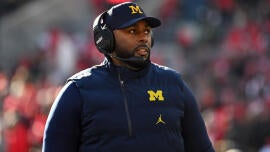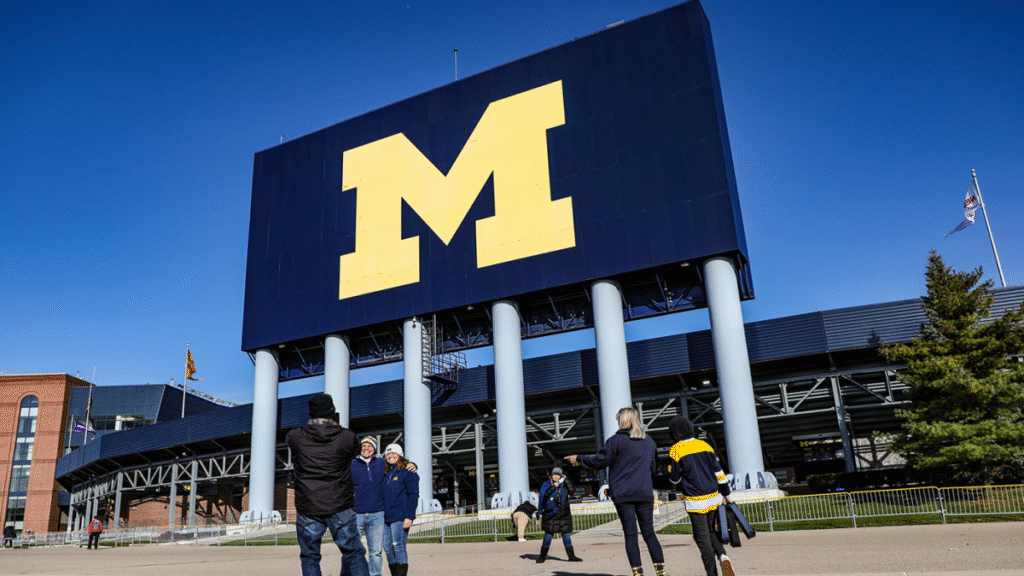The NCAA on Friday levied significant financial penalties, a suspension and historic show-cause terms to members of the 2023 Michigan football staff in the wake of a sign-stealing scandal that rocked the sport as the Wolverines bulldozed their way to a national championship.
Those penalties and a 74-page report that came with them basically end what’s been a two-year soap opera in college football featuring a blueblood program and a brazen attempt at gaining an edge through impermissible scouting by former staff member Connor Stailions, a figure who garnered such interest that he received his own Netflix documentary.
These are the takeaways you need to know about the penalties that were issued and what it means for Michigan moving forward.
The penalties are mostly financial
Outside of an eight-year show cause penalty for Stailions and a 10-year (!!!) show cause for former Michigan coach Jim Harbaugh — along with a three-year show cause penalty for former Michigan staffer Denard Robinson — the penalties levied against Michigan were mostly financial in nature.
Yes, Wolverines coach Sherrone Moore received a three-game suspension — one additional game from the two the team had previously self-imposed — but he’ll only miss one Big Ten game this year (Nebraska on Sept. 20) with the other two games coming against Central Michigan (Sept. 13) and Western Michigan (Sept. 5, 2026.)
The penalties that could really impact Michigan are aimed at the program’s coffers.
Michigan penalties show NCAA punishments changing with times: Emptying wallets arrives as primary deterrent
Tom Fornelli
A $50,000 base fine is peanuts for Michigan; that’s not even a backup lineman. But the NCAA also hit the program with a penalty of 10% of the program’s budget. Given that football produced nearly $150 million in revenue for the 2023-24 fiscal year, the Wolverines will likely be out close to $10 million.
Michigan will also lose out on all postseason revenue sharing for both the 2025 and 2026 seasons, a huge blow that could easily cross $20-plus million with the Big Ten’s usual distribution model.
The NCAA also hit Michigan with a fine equivalent to the cost of 10% of the scholarships awarded to the football program for the 2025-26 academic calendar year.
Altogether, the Wolverines are staring at what could be $30-plus million in penalties.
That matters in the revenue sharing era when schools must come up with $20.5 million more in distributions for its athletes annually.
Michigan announced in June that it planned to reduce its athletic department staffing by 10% to cut costs. This penalty puts the program deeper in the hole in what is an incredibly competitive rev share and NIL marketplace.
The Wolverines were also hit with a 25% reduction in football official visits during the 2025-26 season, which is a blow for a Wolverines 2026 class that currently ranks 11th nationally. The NCAA also levied a 14-week prohibition on recruiting communication.
Also, it’s important to remember Michigan already dealt with a big penalty during the 2023 season when the Big Ten suspended Harbaugh for the final three games of the regular season during a postseason push.
And while those penalties could be sizeable in their totality, not everyone is happy with the level of punishment issued by the NCAA. One Big Ten assistant coach blasted them in a text to CBS Sports’ Matt Zenitz:
“Honestly … It’s a joke. What’s the real impact to the program? This ruling just adds to the “untouchable” perception. Find a big donor to give the $20 mil. Report said they qualified for forfeiting wins and the national championship but that wasn’t enforced? Why not …???””
A Big Ten GM reached by CBS Sports had a more measured approach while also questioning the severity of the penalties:
“Honestly don’t see [the punishments] as a huge deal. They did what they did and won a national title. Problem with NCAA taking so long to dish out a penalty helped Michigan here. Postseason ban with a quicker decision on top of their punishment would have hit harder in this day and age.”
A new way for the NCAA to punish
You’ll notice none of the above penalties included a postseason ban and the loss of scholarships. Previously, a postseason ban would have been standard for a Level I violation of this nature.
But the NCAA explained its shifting rational towards penalties in its release:
“Michigan’s repeat violator status, coupled with its Level I-Aggravated case classification, is sufficient grounds for a multiyear postseason ban. However, the panel determined that a postseason ban would unfairly penalize student-athletes for the actions of coaches and staff who are no longer associated with the Michigan football program. Thus, the panel determined a more appropriate penalty is an offsetting financial penalty instead of a two-year postseason ban.
Similarly, the NCAA membership has shifted from scholarship limits to roster spots. The NCAA membership has not yet determined whether roster reductions will replace scholarship reductions as a core penalty, and the panel did not want to prematurely make that decision on behalf of the membership. Instead, the panel adhered to the percentages contemplated for Level I-Aggravated scholarship reductions but converted the penalty to the financial equivalent of what would have been scholarship reductions.”
That’s a decision that makes a lot of sense.
Previously, players who were not even associated with the era of the rule violations were often the ones punished just because they happened to be on the roster at the time the NCAA’s years-long infraction process played out.
Now, the penalties against the program are aimed more at the people who committed infractions and at the program’s overall bottom line.
Though, if I was an athlete at a place like USC or Oklahoma State, programs that both dealt with massive scholarship losses and postseason bans years after the school’s actual infractions took place, I’d be very frustrated by this delayed shift in thought.
Stalions was on the sideline at CMU
Perhaps the most virial photo of the decade in college football is of an incognito Stalions on the sideline of a Central Michigan game to advance scout against Michigan State.
The NCAA confirmed that was indeed Stalions in its report.
“On one occasion in 2023, Stalions personally engaged in-person scouting when he stood on Central Michigan University’s sideline wearing a bench pass and disguised in Central Michigan-issued coaching gear during the institution’s contest against Michigan State. According to interview statements by a former football staff member, Stalions attended that game in part to decipher Michigan State’s signals but also to help a Central Michigan staff member with play calling.”
Additionally, the NCAA report included the nugget that Stalions admitted to throwing his phone in a pond and breaking it into pieces to hinder the NCAA’s investigation of Michigan.
The NCAA also wrote that Stalions’ counsel was “hostile” at points during their in-person infractions hearing. The NCAA said it was “disappointed by the conduct of Stailions’ counsel. Their approach was not reflective of the civil decorum required and expected by the COI and the membership.”
Michigan sign-stealing penalties: Timeline shows how saga evolved from initial news to NCAA final ruling
Will Backus

No penalties for Chris Partridge
Michigan fired Chris Partridge, the program’s linebackers coach, during the 2023 season in the wake of the sign-stealing scandal. In a statement at the time, Partridge said Michigan AD Warde Manuel told him he was being fired because of a failure “to abide by the University directive not to discuss an ongoing NCAA investigation with anyone associated with the Michigan Football Program.”
There were also reports at the time he tampered with evidence.
However, the NCAA’s report only includes a single mention of Partridge, linking him to a Level II violation of sending text messages to a recruit at an impermissible time.
No penalties were issued against Partridge, who is currently the outside linebackers coach for the Seattle Seahawks.
A bit of relief for Michigan
Do the penalties the NCAA levied hurt Michigan’s bottom line? Of course.
Does it hurt that Moore won’t be on the sideline against Nebraska? Absolutely.
But, in the grand scheme of it all, the Wolverines are making out fine. They won a national championship in 2023. They landed the No. 1 recruit — Bryce Underwood — as part of the 2025 class, giving the program a building block for its future; it’d be a shock if Underwood didn’t start Week 1 for the Wolverines.
The Wolverines have a top 11 recruiting class in 2026. They’re a preseason Top 25 team, and they’re trending the right direction under Moore.
So, the penalties don’t really impact Michigan on the field this season or likely next.
Frankly, getting the punishments out in the open and moving past them is probably going to help the program. Now the uncertainty that came with the investigation is gone.
Texting with several Michigan staffers over the last few hours, a common term that comes up is “relief.” Not necessarily about the penalties but because the cloud that’s hung over the program can now disperse.
Everyone knows what happened (mostly), and almost all the key members of the program from back then.
Underwood and Moore can now lead what is a new era for the program following all the changes that occurred after Harbaugh’s departure. It’s a fresh start.
Read the full article here


